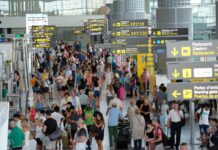According to a press release from the regional Ministry of Education, Culture, Universities and Employment, 99% of the centres that have a school transport service in the Valencian Community have functioned normally and have not reported any incidents in the first week of the school year.
The General Directorate of Teaching Centres has explained that only 5 of the 506 centres that have this service have reported incidents related to school transport to the Ministry since the beginning of the school year, a week ago, which represents 0.9% of all centres that have this service.
In total, 506 educational centres have transport in the Valencian Community (190 of which in Valencia, 204 in Alicante and 112 in Castellón), which amounts to around 1,112 daily expeditions.
Without stating where those reported problems are, the situation is causing increasing anger in Torrevieja, and is even leading to some children breaking the law in order to get to school, as some families turn to electric scooters for transport, which cannot be used by those under 16 in the town.
The PP government in Torrevieja are trying to calm the anger of the parents of hundreds of children who have been left without school transport from the now also PP-run Generalitat Valenciana at the start of the school year, who are also busy trying to blame the previous regional government for failings.
The Councillor for Education, Ricardo Recuero, announced on Monday that the service will be subsidised, but will not be covered by the regional administration. It will be provided at the expense of the municipal budget.
The town council is planning to pay for the service and users will have to justify it afterwards, according to the councillor for the area. The local government, which initially played down the issue of the cancellation of the lines at the start of the school year, was quick to meet last Wednesday with the parents’ associations of affected schools in order to find solutions that would avoid having to demand the restoration of the service from their political partners at a regional level.
Amongst the many cuts that the regional Ministry of Education has implemented, in Torrevieja, six bus lines have been eliminated, four at the IES Torrevigía and two at the Instituto Libertas. The small number of beneficiaries of the service, students whose home is more than three kilometres from the centres, has allowed the regional administration to cut the number of school buses by cutting the lines that ran daily. To optimise the use of the buses that have now been eliminated, they were completed with demanding students who had initially been excluded from the aid, but who had access to transport as authorised persons. With the Ministry’s cuts, one bus is filled only with beneficiaries.
In typical fashion where there is a blatant lack of realisation that municipalities cover areas beyond the urban centres, the regulations of the Generalitat do not take into account that all the secondary schools are located on the outskirts of Torrevieja. There are many students who do not meet the requirement of being more than 3 kilometres away to obtain a scholarship, but their family home is more than 2.5 km away.
The mayor and regional deputy for the PP, Eduardo Dolón, who denounced as “inexplicable” very similar decisions to eliminate buses by that previous PSOE-led regional government, demanding that the buses were restored, is happy for the same cuts to be applied by his own political partners, justifying the cuts in this academic year for economic reasons.














